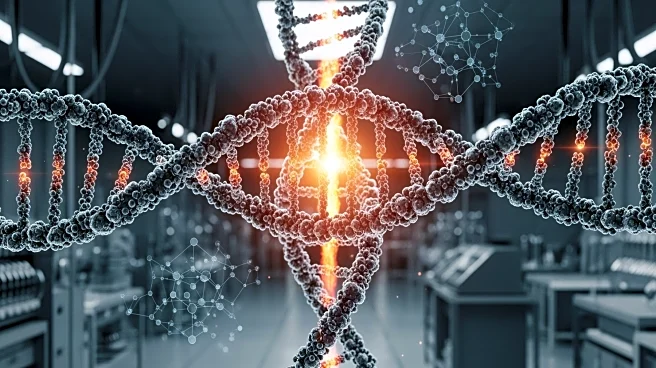What's Happening?
Caltech researchers have introduced a novel method to power DNA-based molecular circuits using heat, enabling reusable DNA logic gates. This advancement, published in Nature, utilizes temperature cycles
to reset DNA systems, allowing for repeated computations without the need for enzyme-based or chemical fuel systems. The study highlights the use of heat as a universal energy source, which resets DNA circuits into kinetically trapped states, facilitating scalable and sustainable molecular computing. The redesigned DNA hairpin gate architecture incorporates specific design features to ensure efficient reset during heating and cooling cycles, achieving a reset efficiency exceeding 90%. This innovation allows for complex tasks such as logic operations and neural network behaviors to be executed across multiple cycles, demonstrating the potential for sustained computation in DNA-based systems.
Why It's Important?
The development of heat-powered reusable DNA circuits marks a significant advancement in molecular computing, offering a sustainable and scalable solution for complex computations. This technology has the potential to revolutionize fields such as chemical sensing, programmable matter, and smart diagnostics by enabling autonomous molecular machines that operate without human intervention or replenishable fuels. The ability to reset and reuse DNA circuits could lead to more efficient and environmentally friendly computing systems, reducing waste and improving the autonomy of DNA-based technologies. This breakthrough could impact various industries by providing new tools for data processing and decision-making in molecular systems.
What's Next?
The next steps involve further refining the DNA circuit designs to enhance their efficiency and reliability across multiple cycles. Researchers may explore additional applications for these reusable DNA circuits in areas such as environmental monitoring, medical diagnostics, and bioengineering. The scalability of this technology could lead to the development of more complex molecular computing systems capable of performing advanced tasks autonomously. Continued research and experimentation will be crucial in expanding the capabilities of heat-powered DNA circuits and integrating them into practical applications.
Beyond the Headlines
This innovation raises important ethical and policy considerations regarding the use of molecular computing in sensitive areas such as healthcare and environmental monitoring. The ability to autonomously process data and make decisions at the molecular level could lead to new regulatory challenges and require careful oversight to ensure safe and responsible use. Additionally, the long-term implications of widespread adoption of this technology could influence the development of new standards and practices in molecular computing and related fields.










